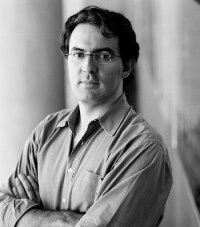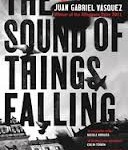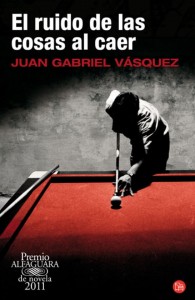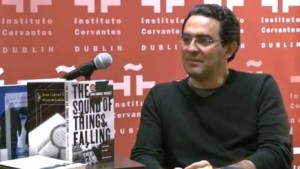Blog del Instituto Cervantes de Dublín
Torre Martello
Club de lectura en español / Spanish Language Book Club
Fecha: Jueves, 3 de diciembre de 2015
Hora: 18:30 pm
Lugar: Instituto Cervantes Dublín, Lincoln House – Lincoln Place, Dublín 2
El otoño ha llegado y reconforta disfrutar de una buena lectura.
Desde la Biblioteca Dámaso Alonso queremos invitaros a participar en un nuevo proyecto: un club que ofrece la posibilidad de dialogar sobre literatura en español en un entorno distendido. Nos reuniremos una vez al mes para debatir sobre una obra previamente acordada.
Si te interesa la literatura en español y buscas la oportunidad de practicar el idioma, ¡no dudes en ponerte en contacto con nosotros!
La primera reunión tendrá lugar el jueves 3 de diciembre a las 18:30 horas, y la obra seleccionada es El ruido de las cosas al caer, del escritor colombiano Juan Gabriel Vásquez.
Si deseas participar en el club de lectura o incluso colaborar en su gestión, envíanos un mensaje a bibdub@cervantes.es
Estad atentos a nuestro Facebook, donde publicaremos más información en breve.
Texto: María Toribio
Versión en inglés: Enca González Cambil
International IMPAC Dublin Literary Award 2014
Date: Thursday, December 3rd
When: 6:30 pm
Where: Instituto Cervantes Dublín, Lincoln House – Lincoln Place, Dublín
The Autumn season is upon us. It is time to curl up with a good book and a piping hot cup of tea.
We are very excited about a project we are preparing at the Dámaso Alonso Library: a club that allows you to discuss your favourite books in Spanish in a friendly and relaxed atmosphere. We will meet once a month to talk about a book previously chosen by the club.
Let us know if you are interested in Literature written in Spanish and wish to talk about your preferred authors in the Spanish language.
Our First meeting will take place on Thursday, December 3rd at 6:30 pm. The chosen novel is The sound of things falling, the third novel by Colombian author Juan Gabriel Vásquez.
If you wish to join is or even collaborate on running the club, just email us at bibdub@cervantes.es
Keep an eye on our Facebook page for updates!
English version: Enca González Cambil
Juan Gabriel Vásquez, Premio IMPAC 2014. ¡Felicidades! / Congratulations!
Juan Gabriel Vásquez: Write Only if You Think That you will Be Unhappy Otherwise
Interview with Juan Gabriel Vásquez on the 14th November 2012, at the Dámaso Alonso Library of the Instituto Cervantes in Dublin, in association with his participation in the launch of his lastest novel, The Sound of Things Falling.
Juan Gabriel Vásquez (Bogotá, 1973) is the author of a collection of stories, Los amantes de Todos los Santos, and the novels Los informantes (The Informers, Riverhead Books, 2009) and Historia secreta de Costaguana (The Secret History of Costaguana, Riverhead Books, 2011). He has also published a collection of literary essays, El arte de la distorsión (which include an essay that won the Simón Bolívar Award in 2007), and a brief biography of Joseph Conrad, El hombre de ninguna parte. He has translated works by John Hersey, John Dos Passos, Victor Hugo and E. M. Forster, amongst others, and is a columnist for the Colombian newspaper El Espectador. His books have been published in fourteen languages and thirty countries. His third novel, El ruido de las cosas al caer, (The Sound of Things Falling, Bloomsbury, 2012) won the Alfaguara Award in 2011.
Sergio Angulo: —Juan Gabriel, The Sound of Things Falling is your latest novel, tell us about it.
Juan Gabriel Vásquez: —The novel is the story of this young law professor called Antonio Yammara, who one day meets this mysterious character, a guy called Ricardo Laverde, who evidently has something to hide and is not who he says he is. What begins as this frivolous curiosity, turns into something more serious when this Ricardo Laverde gets killed by a sniper in the street, by a hit-man. The narrator gets hit by a bullet, a straight shot that obviously changes his life. He becomes obsessed with finding out who this guy really was and why he was killed, in order to reach some conclusions about what has happened to him and why his life has changed. So he embarks on this personal investigation, a personal enquiry into the life of a dead man and his past of Colombia. This sends him back to the years in which the drug trade effectively began in Colombia, the early seventies.
We learn that this guy was a pilot and he was not only a witness, but also a participant in the first phase of the drug trade. The novel becomes a sort of exploration of what it means to my generation to grow up surrounded by the drug trade, and particularly, what it means for us to have suffered through the worst years of drug-related violence – of the drug wars in the eighties, when Pablo Escobar basically declared war against the Colombian Government. This is what I have tried to explore.
Sergio Angulo: —The story is not a real case, but it somehow, portrays the reality of this era in Colombia.
Juan Gabriel Vásquez: —It’s a work of fiction, but I tried to explore things that really happened. One of my obsessions has been, not only in this novel, but in my other novels too, how public events shape our private lives. This is one of the things that interests me as a novelist – how things that happened in what we call “history” or “politics” penetrate our lives and affect the way we behave as friends, or as couples, or as parents and children.
One of the reasons behind the writing of this novel was to realise that, in those years, during that period of violence, we had a lot of public information, we had a lot of statistics, a lot of images in the media, (we can even find the video of a presidential candidate in Colombia getting killed) but, at some point, I became anxious at the idea that there wasn’t a place we could go to find out about the effects all of this had had on private or personal lives. In a way, the novelist I wanted to be, is a sort of historian of emotions. I tried to explore the emotional and moral side of those very public events.
Sergio Angulo: —You were living in France for a while and, as far as I know, you are now based in Spain, in Barcelona. Has this distance had any effect on the way you see Colombia now?
Juan Gabriel Vásquez: —It’s very difficult to prove, but I’ve always said that, the only reason I´m able to write about Colombia, is because I have left. My first book was a book of stories about Belgium and France, and people used to ask me, “Why don’t you write about Colombia?” And the reason, to sum it up in a nutshell, is that I felt that, since I didn’t really understand my country, I wasn’t allowed to write about it. But because of the distance, because of the time I spent abroad, and because there was an ocean between my country and me, I ended up realising that, perhaps the fact that I didn’t understand my country was the best reason to write about it. I could use novels as a way of understanding the history of my country and how that has shaped me as an individual.
Sergio Angulo: — Historically, Barcelona is a place where many of the most important Latin American authors have lived. Now we are celebrating the 50th anniversary of the Latin American literary boom. Is this literary boom still happening, or has there been a turning point with new generations taking different paths?
Juan Gabriel Vásquez: —I always considered the writers of the Latin American boom as the real founders of my tradition. The tradition in which I tried to write began with them. Before them, the Latin American novel had maybe produced a couple of isolated things, very interesting things, but isolated. There wasn’t a tradition of Latin American novels to speak of. It all began with Vargas Llosa, García Márquez, Carlos Fuentes and Julio Cortázar. So, in a way, they’re quite present for me, in the sense that they are all still living. Vargas Llosa and García Márquez are still living. Vargas Llosa is still writing. But, at the same time, they are classics. They are living classics, and for me, having them sharing the same world, is almost as if a 21st Century Irish writer could pick up the phone and call James Joyce. It’s a very strange situation, and a very profitable one. I don’t feel in any way threatened by their presence, as many writers do. I feel there is a very big legacy that has opened doors for the people who have come after them.
Sergio Angulo: —Living in Europe, is our perception of Latin America accurate?
Juan Gabriel Vásquez: —There is always a certain degree of inacuracy. But it works both ways. The media have an extraordinary ability to distort the image of a country, sometimes through no fault of their own, because time in the media is limited, resources in the media are limited… But one of the nice things that novels do is, in a way, fight against cliché, against stereotypes, so perhaps we, as readers, get a much better understanding about the complexity of the United States, when we read Philip Roth. Maybe an Irish reader, or a British reader, will get a better understanding about Colombia and the complexity of life there, the contradictions, the unpredictability of life in Colombia, when they read a novel such as this one. In any case, that’s what I would like to see happening.
Sergio Angulo: —You are very young, but you are already at the peak of the literary world. How is the view when looking down?
Juan Gabriel Vásquez: —In reality, I’m looking towards the next book, and wondering how difficult it will be to write it, because one of the cruel things of this trade is that every book is more difficult than the last one, in the sense that you know more things, you’re more conscious of the pitfalls and the problems, and the difficulties of writing. You don’t want to repeat yourself. I’m one of those writers who wants to change with every book. You always get deeper and deeper into this arrogant mindset that you can write a book like the books you love. And I think that’s what you constantly strive to do. You never get to do it, of course, because it’s impossible to write a book like those books that made me want to become a writer. But I think in the attempt to accomplish this, you might give the reader a couple of nice pages, and that’s probably enough.
Sergio Angulo: —Finally, any advice for a young writer who is at the bottom of the hill, getting his book and his backpack ready to start climbing the mountain?
Juan Gabriel Vásquez: —Well, I always give the same piece of advice, which is very simple but very honest, and I think it’s very useful, – Write only if you feel it’s absolutely necessary. The writing life is a very difficult life to live. You have to sacrifice friends, you have to sacrifice time with your family, so write only if you think that you will be unhappy if you don’t do it. Forget about the money, the reviews… they don’t matter. Write only if you know that your only reward will be the satisfaction of a job well done.
Recommended links
- [Video] Interview with Juan Gabriel Vásquez at the Instituto Cervantes in Dublin by Sergio Angulo.
- Juan Gabriel Vásquez in El Espectador.
- Juan Gabriel Vásquez in Alfaguara.
[Video] Entrevista a Juan Gabriel Vásquez / Interview with Juan Gabriel Vásquez
Juan Gabriel Vásquez es uno de los mejores novelistas de su generación, y El ruido de las cosas al caer, que aborda el devenir de Colombia durante la época de Pablo Escobar, es una de sus grandes novelas.
El pasado mes de noviembre, tuvimos la suerte de recibir a Juan Gabriel Vásquez en el Instituto Cervantes de Dublin, donde presentaró y leyó algunos fragmentos de su libro. El autor colombiano fue entrevistado por la periodista de RTE Paula Shields y a continuación mantuvo un animado debate con el público.
En este video, nuestro compañero Sergio Angulo charla con él acerca de El Ruido de las cosas al caer, Premio Alfaguara de Novela 2011, que ahora ha sido traducida al inglés.
Juan Gabriel Vásquez (Bogotá, Colombia, 1973) estudió derecho en su ciudad natal y más tarde se doctoró en Literatura Latinoamericana en La Sorbona. Actualmente reside en Barcelona. Es autor de tres novelas “oficiales” —Los informantes, Historia secreta de Costaguana y El ruido de las cosas al caer—, aunque escribió otras cuando tenía 23 y 25 años de edad, que él prefiere eliminar. Sus novelas han sido traducidas en Inglaterra, Francia, Holanda, Italia y Polonia.
Juan Gabriel Vasquez is one of the leading novelists of his generation, and The Sound of Things Falling that tackles what became of Colombia in the time of Pablo Escobar is his best book to date.
We are so lucky to have him at the Instituto Cervantes Dublin, where he introduced and read an extract of his book and he was interviewed by RTE journalist Paula Shields.
Juan Gabriel Vásquez (Bogotá, Colombia, 1973) studied law in his hometown and obtained a phd in Latin American Literature in the Sorbone University. At present he lives in Barcelona. He has published three “official” novels – The informers, The secret history of Costaguana and The Sound of Things Falling— however he wrote others at the age of 23 and 25 which he prefers to omit. His works have been translated in England, France, Netherlands, Italy and Poland.
Presentación de libro: “El ruido de las cosas al caer” de Juan Gabriel Vásquez | Book launch: “The sound of things falling” by Juan Gabriel Vásquez
 Hoy a partir de las 19:00 horas podrás disfrutar de la presentación de la traducción al inglés del último libro del autor colombiano Juan Gabriel Vásquez. El acto tendrá lugar en el Café Literario.
Hoy a partir de las 19:00 horas podrás disfrutar de la presentación de la traducción al inglés del último libro del autor colombiano Juan Gabriel Vásquez. El acto tendrá lugar en el Café Literario.
Se le considera uno de los mejores novelistas de su generación, y El ruido de las cosas al caer, que aborda el devenir de Colombia durante la época de Pablo Escobar, es hasta la fecha su mejor novela.
Tan pronto conoce a Ricardo Laverde, el joven Antonio Yammara comprende que en el pasado de su nuevo amigo hay un secreto, o quizá varios. Su atracción por la misteriosa vida de Laverde, nacida al hilo de sus encuentros en un billar, se transforma en verdadera obsesión el día en que éste es asesinado.
Convencido de que resolver el enigma de Laverde le señalará un camino en su encrucijada vital, Yammara emprende una investigación que se remonta a los primeros años setenta, cuando una generación de jóvenes idealistas fue testigo del nacimiento de un negocio que acabaría por llevar a Colombia —y al mundo— al borde del abismo.
Juan Gabriel Vásquez (Rosario, Colombia, 1973) estudió derecho en su ciudad natal y más tarde se doctoró en Literatura Latinoamericana en La Sorbona. Actualmente reside en Barcelona. Es autor de tres novelas “oficiales” —Los informantes, Historia secreta de Costaguana y El ruido de las cosas al caer—, aunque escribió otras cuando tenía 23 y 25 años de edad, que él prefiere eliminar. Sus novelas han sido traducidas en Inglaterra, Francia, Holanda, Italia y Polonia.
We are delighted to invite you to the book launch of the translation into English of the last novel written by Colombian writer Juan Gabriel Vásquez. The event will take place today at 7pm at Café Literario.
Juan Gabriel Vasquez is one of the leading novelists of his generation, and The Sound of Things Falling that tackles what became of Colombia in the time of Pablo Escobar is his best book to date.
No sooner does he get to know Ricardo Laverde than young Antonio Yammara realises that his new friend has a secret, or rather several secrets. Antonio’s fascination with the life of Laverde begins by casual acquaintance in a billiard hall and grows until the day Ricardo is murdered.
More out of love with life than ever, he starts asking questions until the questions become an obsession that leads him to Laverde’s daughter. His troubled investigation leads all the way back to the early 1960s, marijuana smuggling and a time before the cocaine trade trapped a whole generation of Colombians in a living nightmare of fear and random death.
Juan Gabriel Vásquez (Rosario, Colombia, 1973) studied law in his hometown and obtained a phd in Latin American Literature in the Sorbone University. At present he lives in Barcelona. He has published three “official” novels – The informers, The secret history of Costaguana and The Sound of Things Falling— however he wrote others at the age of 23 and 25 which he prefers to omit. His works have been translated in England, France, Netherlands, Italy and Poland.





